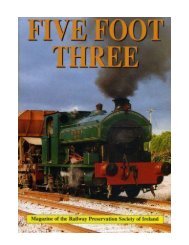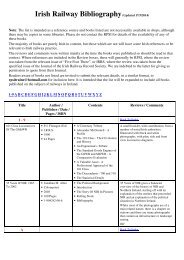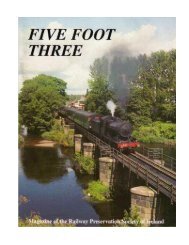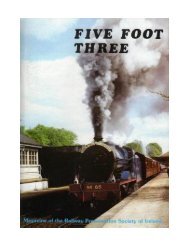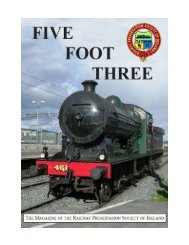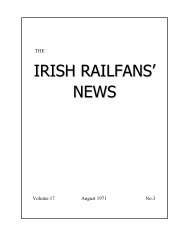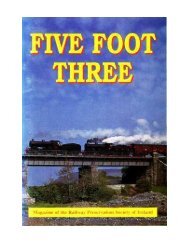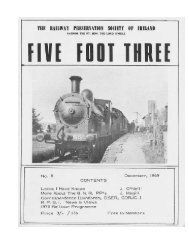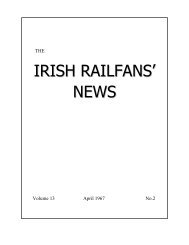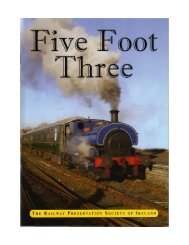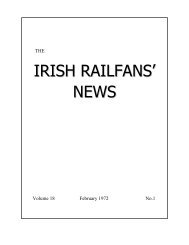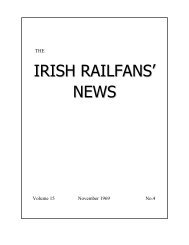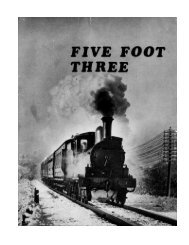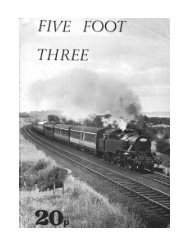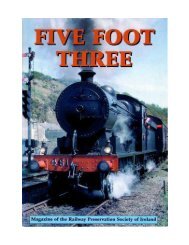Five Foot Three Number 14 - Railway Preservation Society of Ireland
Five Foot Three Number 14 - Railway Preservation Society of Ireland
Five Foot Three Number 14 - Railway Preservation Society of Ireland
You also want an ePaper? Increase the reach of your titles
YUMPU automatically turns print PDFs into web optimized ePapers that Google loves.
The driver with me all the time was Jack Tinman from the Donegall Pass. Tinman and I got to know<br />
one another very well, being together so <strong>of</strong>ten. He would be talking away all the time going up the<br />
bank, which he called ‘the long haul’. If the engine gave a couple <strong>of</strong> slips, Tinman would say, “That’s<br />
Father Murphy and his mountain dew (poteen). When we get to Dublin I’ll report him to the<br />
Archbishop and have him transferred to Tralee - or reduced.”<br />
Traffic got so heavy around this time that Glover in Dundalk was complaining about his engines being<br />
abused so much, and he demanded a banker for the goods. This made life easier for us because the<br />
engine that banked a north-bound train out <strong>of</strong> Dundalk to Goraghwood came in behind us to help us up<br />
the hill. Curiously enough the name <strong>of</strong> the Dundalk driver was none other than Johnny Murphy.<br />
If we got into difficulties on the bank, Tinman would maintain that there was some sort <strong>of</strong> conspiracy<br />
afoot. He would say, “That fella must be a brother <strong>of</strong> Father Murphy and between the two <strong>of</strong> them<br />
they’re out to hang me!”<br />
When working the pick-up goods we usually got into Dublin about eight but, if we got caught behind<br />
the local trains, it could be about nine or half nine. Then, after sleeping in Dublin, we usually would<br />
take the 11:15pm goods back to Belfast with the same engine, which was usually C class No.178.<br />
Tinman was a great man for feeding, and in Dublin he usually bought a load <strong>of</strong> beef and onions. Then,<br />
before we set <strong>of</strong>f, he put all this into a small pot and set it up on the faceplate where it was nice and<br />
warm and the meat would slowly stew.<br />
Going across Malahide strand you could feel the spray <strong>of</strong> the salt water on your face. This made the<br />
engine slip <strong>of</strong> course and this meant more work and by the time we made our first stop at Drogheda we<br />
were ready for a feed.<br />
At Drogheda we would pull forwards onto the Boyne bridge while the shunting engine took wagons <strong>of</strong>f<br />
the back <strong>of</strong> the train. The wind out there above the river on a stormy night was fierce. The wind was so<br />
strong that it would lift huge lumps <strong>of</strong> coal <strong>of</strong>f the tender and hurl them down into the Boyne but we<br />
had wooden sides screwed up on the cab sides to keep out the piercing wind.<br />
We had half an hour at Drogheda to make the first tea <strong>of</strong> the night and we would take down the stew<br />
and have a right old feed.<br />
After another stop at Dundalk for water and filling the bunk, we had the Wellington bank to tackle,<br />
with the aid <strong>of</strong> a banker. Jack would start away up the bank very slowly and we would be crawling with<br />
both engines working hard. At that time Guinness in Dublin were sending up a lot <strong>of</strong> porter to the<br />
North and the railway hadn’t enough porter wagons for the traffic. So barrels <strong>of</strong> Guinness were loaded<br />
into flat wagons. The locals around Mountpleasant took advantage <strong>of</strong> the slow moving train to climb in<br />
to the open wagon and throw overboard a barrel to quench their thirst.<br />
Of course with the shortage <strong>of</strong> proper porter wagons the barrels were <strong>of</strong>ten liable to spring a leak but<br />
there were always plenty <strong>of</strong> conscientious railwaymen around armed with beakers, cups and mugs to<br />
make sure the railway’s permanent way wasn’t damaged in any way.<br />
In 1919, I remember, I was firing on the 10:0pm Belfast-Derry goods and I was with various drivers<br />
and engines. At Dungannon we would make a rush for the tunnel at maybe 15 or 20 mph and get into it<br />
and out again as quick as we could. I pitied drivers who suffered from bronchitis for they used to cough<br />
and choke terribly in the tunnel.<br />
One driver I was with used to lap a wet handkerchief round his face and lie down flat across the<br />
footboard with his head out between the engine and tender to breathe the air churned up by the engine<br />
wheels. The whole cab would be enveloped in smoke and steam and if she slipped at all it was terrible.<br />
In fact it was nothing unusual with a small engine to stick in the tunnel. If I thought we were slipping<br />
badly I would put out my hand and touch the tunnel wall to find out if we were moving forward or



